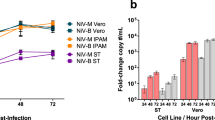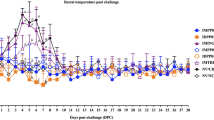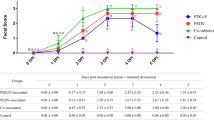Domestic pigs are susceptible to experimental infection with non-human primate-derived Reston virus without the need for adaptation
newsletter via Feeds on Inoreader 2024-01-09
Summary:
Scientific Reports 14, Article number: 715 (2024) Cite this article
-
19 Accesses
-
1 Altmetric
Domestic pigs are a critical component of the food supply and one of the most commonly raised production animals. Pork consumption has driven the intensification of pig production expanding into environments conducive to increased emergence and spread of infectious diseases, including the spillover of pathogens into human populations. One of these emerging viruses, Reston virus (RESTV), is an enigma among the Orthoebolavirus genus in that its lack of human pathogenicity is in stark contrast to the high virulence associated with most other ebolaviruses. RESTV is, however, associated with outbreaks of highly lethal hemorrhagic disease in non-human primates (NHP), as well as poorly understood clinical manifestations of mixed virulence and lethality in naturally and experimentally infected domestic pigs. Our results show it is possible for RESTV derived from an NHP to infect domestic pigs resulting in a spectrum of disease, from asymptomatic to severe respiratory distress. Further, we report on the first experimental transmission of RESTV between infected pigs and a co-housed, naïve animal, as well as the first report of the successful use of group oral fluids for the detection of RESTV RNA and virus-specific IgA antibodies.

S. B. Kasloff, A. Leung, … H. M. Weingartl

Adthakorn Madapong, Kepalee Saeng-chuto, … Dachrit Nilubol

Kepalee Saeng-chuto, Adthakorn Madapong, … Dachrit Nilubol
Reston virus (RESTV) is a negative sense, non-segmented RNA virus of the family Filoviridae, genus Orthoebolavirus, that was discovered in 1989 during an outbreak in non-human primate (NHP) quarantine facilities in Virginia and Pennsylvania, USA, involving cynomolgus macaques (Macaca fascicularis) imported from the Philippines1,2. Since that time, sporadic outbreaks have been reported surrounding repeat incidents in the United States and Italy, all traceable to the Island of Luzon, Philippines3. In 2008, RESTV emerged in domestic pigs (Sus scrofa domesticus) from the Island of Luzon, and, subsequently, ebolavirus sequences and virus-specific antibodies have been detected in pigs from a variety of locations, including China, Guinea, Sierra Leone, and Uganda4,5,6,7,8. The presence of RESTV and other ebolaviruses in the human food chain substantiates the relationship with domestic pigs with these pathogens as a public health concern requiring further investigation4,9,10.
RESTV is a zoonotic pathogen, known to be capable of infecting humans. In contrast to the other Orthoebolavirus, though, infection has not been associated with the development of overt, appreciable disease; and the reasons for this lack of pathogenicity are unknown11,12,&